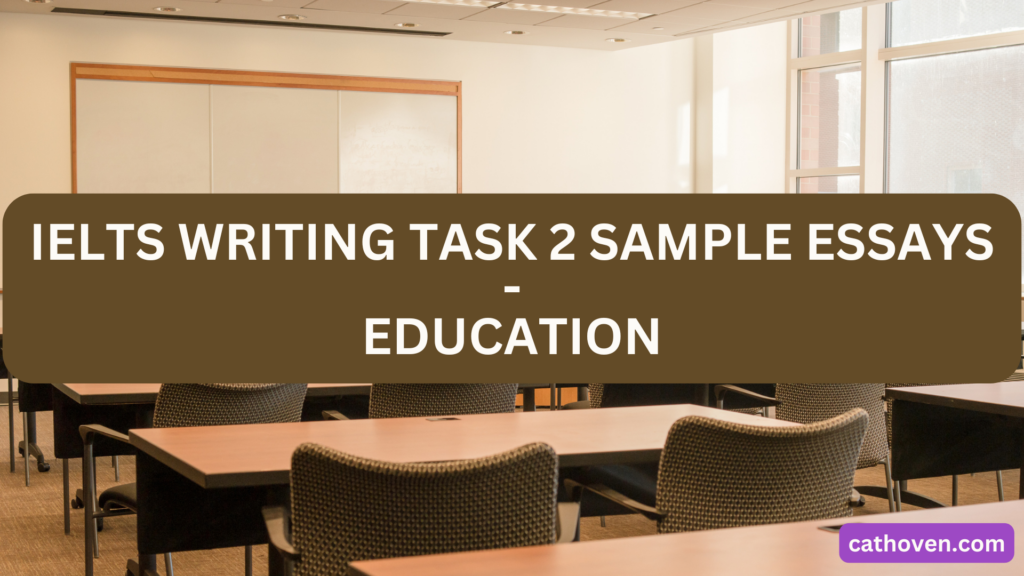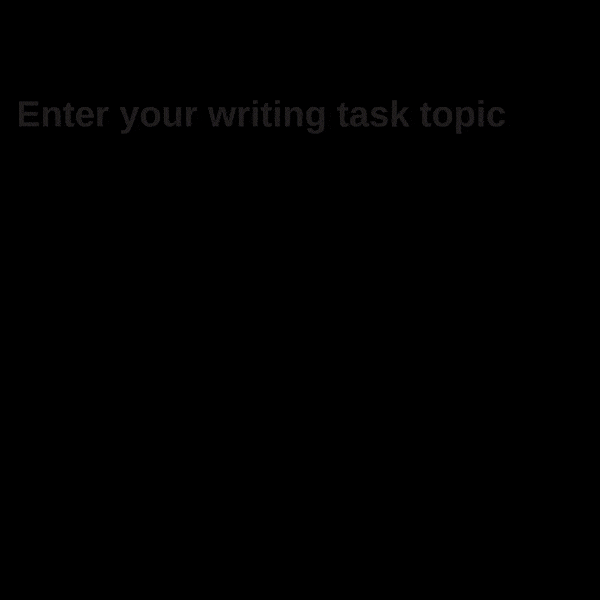IELTS Writing Task 2: Sample Questions and Answers About Education
- Home
- »
- IELTS Writing Task 2: Sample Questions and Answers by Category
- »
- IELTS Writing Task 2: Education Sample Questions and Answers
This page provides a mix of real and authentic education-related sample questions and answers for IELTS Writing Task 2. Featuring essential vocabulary and concepts, these examples will help you develop strong ideas and arguments for your essays. Use them to enhance your writing skills and confidently tackle a range of topics within the education field.

Example 1 - Go to college or leave the school for a successful life
Some people believe that studying at college or university is important for a successful career. Others think that it is better to leave school and find work to gain experience for a successful professional life. Discuss both views and give your opinion.
See the Model Answer for Band 9
In recent years, the debate regarding how to enhance the quality of education has gained considerable attention. While some individuals argue that increasing teachers’ salaries is the most effective method, others contend that improving educational resources is more crucial. This essay will discuss both perspectives before concluding that a combination of both approaches is necessary for significant improvements.
On one hand, proponents of higher salaries for teachers argue that financial incentives can lead to better teaching quality. When educators are compensated fairly, they are likely to feel more valued and motivated, which can enhance their teaching performance. Additionally, higher salaries may attract more qualified individuals to the profession, leading to an increase in the overall standard of education. In many cases, teachers who feel underappreciated may become disengaged, negatively impacting student learning.
On the other hand, those who advocate for improving educational resources emphasize the importance of providing schools with the necessary tools to facilitate effective learning. Resources such as updated textbooks, advanced technology, and extracurricular programs can significantly enhance the educational experience for students. By investing in infrastructure and materials, schools can create a more stimulating environment that fosters academic achievement. Furthermore, without adequate resources, even the most dedicated teachers may struggle to deliver high-quality education.
In my opinion, both increasing teachers’ salaries and improving educational resources are essential for enhancing the quality of education. While well-paid teachers are likely to be more motivated, it is equally important to equip them with the right resources to facilitate effective teaching. A balanced approach that addresses both aspects can lead to a more robust educational system that benefits both teachers and students alike.
See the Model Answer for Band 8
Building a successful career is a top priority for many people today. Some believe that studying at a college or university is essential to achieve this, while others argue that entering the workforce early to gain hands-on experience is a better route. Both views have their strengths, which I will discuss before sharing my opinion.
On one hand, formal education offers valuable skills and credentials, particularly in specialized fields like medicine, engineering, and law. A university environment fosters critical thinking, problem-solving abilities, and expertise, which are crucial for complex professions. Additionally, degrees can provide a competitive edge, as many high-paying jobs require formal qualifications. Beyond knowledge, students gain networking opportunities and internships that contribute to professional growth.
Conversely, others argue that practical experience is equally, if not more, valuable in certain industries. By starting work early, individuals can gain real-world skills, build professional relationships, and earn income sooner. For fields like technology and business, hands-on experience is often prioritized by employers, who value efficient problem-solving and industry knowledge over theoretical learning. Many successful professionals have thrived without degrees by developing skills directly in the workplace.
In my view, a balanced approach is ideal. While formal education provides a solid foundation, work experience offers practical insights and adaptability. Combining both, such as through internships or apprenticeships, may offer the most effective path to career success.
Example 2 - Will Traditional Classrooms Disappear by 2050?
Some people believe that the typical teaching situation of a teacher and students in the class will not exist by the year 2050.
To what extent do you agree or disagree?
See the Model Answer for Band 8
As technology rapidly advances, some believe that the traditional classroom, where a teacher instructs students face-to-face, will no longer exist by 2050. While it is likely that education will evolve significantly, I partially disagree with the notion that in-person teaching will disappear entirely, as there will still be a need for human interaction in education.
One argument supporting the shift away from traditional classrooms is the increasing role of technology in education. Virtual learning platforms, artificial intelligence, and online resources now provide flexible and accessible alternatives to physical classrooms. By 2050, these tools will likely be even more sophisticated, allowing for highly personalized, self-paced learning experiences. This development may reduce the need for large, physical classrooms, particularly in subjects that can be taught effectively through virtual simulations or automated feedback systems.
However, certain elements of traditional teaching will remain difficult to replicate through technology alone. Many subjects, such as those involving hands-on skills or social interactions, require a level of guidance and feedback that is best provided face-to-face. Moreover, in-person learning fosters socialization and critical thinking through group discussions and collaborative projects. These elements are vital for students’ personal and social development, which may be hard to achieve in a purely digital environment.
In conclusion, while technology will transform many aspects of education by 2050, the role of in-person teaching will remain important for a balanced educational experience. Therefore, it is unlikely that the traditional teaching model will vanish entirely.
Example 3 - The Effectiveness of Traditional vs. Online Learning
Some people believe that traditional classroom learning is more effective than online learning. To what extent do you agree or disagree?
See the Model Answer for Band 8
While online learning offers convenience and flexibility, I believe traditional classroom learning remains more effective overall due to its advantages in engagement, social interaction, and hands-on learning.
Firstly, traditional classroom settings allow for direct interaction between students and teachers, which can be essential for learning. In a classroom, students can ask questions and receive immediate feedback, making the learning experience more interactive and tailored. By contrast, online learning often lacks real-time engagement, which may lead to a more passive learning experience and potentially lower motivation.
Additionally, the social aspect of classroom learning is valuable, as it encourages students to work together, communicate, and form relationships. Group projects, discussions, and collaborative activities are easier to facilitate in person, and these interactions help students develop social and teamwork skills. Although online courses offer forums and chat rooms, they are often less personal and spontaneous, limiting meaningful connections.
Finally, hands-on experiences are much more accessible in a classroom setting. Subjects like science and art often require practical applications that can be difficult to replicate online. Physical classrooms provide access to equipment and resources that enhance understanding through direct practice.
In conclusion, while online learning has advantages in flexibility, traditional classrooms foster a more effective environment for engagement, socialization, and practical skills development. Thus, I agree that traditional learning is generally more effective for most students.
Example 4 - Practical skills or academic knowledge?
It is often said that children benefit more from learning practical skills than academic knowledge. Do you agree or disagree?
See the Model Answer for Band 8
I agree that children benefit more from learning practical skills than academic knowledge. Practical skills are essential for preparing children to handle real-life challenges and function independently as adults, which is often more immediately useful than abstract academic knowledge.
Firstly, practical skills equip children with abilities they will use daily, such as budgeting, cooking, and effective communication. These skills empower children to take responsibility for themselves and navigate life’s challenges confidently. For example, children who learn basic financial management at a young age are likely to make better decisions with money, avoiding common financial pitfalls in adulthood.
Additionally, practical skills are increasingly valued in the job market. Employers often seek candidates who demonstrate hands-on experience and can quickly adapt to practical tasks. Skills like teamwork, problem-solving, and adaptability are better developed through practical learning, while traditional academic subjects sometimes overlook these crucial abilities. As a result, children who focus on practical skills may be better equipped to enter the workforce and thrive professionally.
While academic knowledge has its place, I believe that too much emphasis on theory can limit children’s readiness for real-life situations. Therefore, focusing on practical skills provides children with a more well-rounded and useful education that directly prepares them for the demands of everyday life.
In conclusion, I believe children benefit more from practical skills than from academic knowledge, as these skills build independence, adaptability, and direct readiness for the real world.
Example 5 - Exams vs. Continuous Assessment
Some people believe that exams are an ineffective way to assess students’ abilities and should be replaced with continuous assessment. What is your opinion?
See the Model Answer for Band 8
I believe that exams are an ineffective way to assess students’ abilities and should be replaced with continuous assessment. Continuous assessment provides a more accurate and holistic view of a student’s skills and understanding, as it evaluates their progress over time rather than in a single, high-pressure setting.
Firstly, exams often create intense stress, which can lead to poor performance that doesn’t truly reflect a student’s knowledge. Some students may understand the material well but struggle with test anxiety, which can cause them to perform below their actual ability. Continuous assessment, such as projects, assignments, and class participation, allows students to demonstrate their skills without the pressure of a timed exam. This approach is more supportive and encourages consistent effort, making it a better indicator of a student’s abilities.
Moreover, continuous assessment helps students develop a variety of skills that are not tested in traditional exams, such as teamwork, communication, and practical problem-solving. These are essential skills for real-world success, and they can be effectively developed through activities like group projects and presentations. Exams, in contrast, tend to focus mainly on memorization and test-taking strategies rather than true understanding and application.
In conclusion, I believe continuous assessment is a more effective and fair method of evaluating students’ abilities. It not only reduces stress but also encourages a broader range of skills, making it a better approach for preparing students for future challenges.
Improve Your IELTS Writing with Our Essay Checker Tool

Easily enhance your writing skills with our IELTS Essay Checker! Here’s how it can help:
- Get Instant Feedback: Upload your essay and receive immediate, detailed feedback on your writing.
- Identify Areas for Growth: See where you can improve in grammar, vocabulary, structure, and coherence.
- Track Your Progress: Understand your current score level and watch as your skills grow.
This tool is ideal for refining your practice essays, helping you work towards a higher band score with confidence.
Frequently Asked Questions
How are these model essays assessed?
These model essays are evaluated using our IELTS Essay Checker, a tool developed by AI linguists and experienced IELTS teachers. The checker assesses each essay according to IELTS scoring criteria, focusing on coherence, grammar, vocabulary, and task achievement to give you accurate feedback and insights into achieving a high score.
Can I use the IELTS Essay Checker for my own essays?
Yes! Our IELTS Essay Checker is available for users to analyze their own essays. By uploading your response, you can receive detailed feedback on your strengths and areas for improvement, helping you refine your skills for the actual test.
How can model essays help improve my writing score?
Reviewing model essays exposes you to high-quality writing that meets IELTS criteria, such as clear argumentation, organized structure, and effective vocabulary use. Practicing with these examples can help you develop similar qualities in your own writing, boosting your score.
